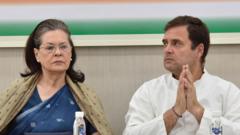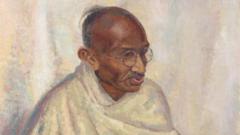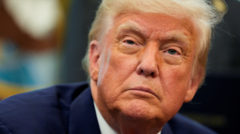The Enforcement Directorate's charges against India's Gandhis have ignited outrage within the opposition, prompting demonstrations across the nation.
Gandhi Family Faces Serious Charges as Congress Plans Nationwide Protests

Gandhi Family Faces Serious Charges as Congress Plans Nationwide Protests
Sonia and Rahul Gandhi accused of money laundering amidst rising political tensions in India.
India's Congress party has announced mass protests for Wednesday, following serious money laundering charges levied against senior members, including Sonia and Rahul Gandhi. The Enforcement Directorate (ED) detailed its accusations in a Delhi court, asserting that the Gandhis established a shell company to unlawfully acquire National Herald assets valued at over 20 billion rupees (approximately $233 million).
Congress spokesperson Jairam Ramesh decried the allegations as mere "politics of vendetta and intimidation" by the current administration. While the Gandhis previously denied any involvement in illegal activities, they have thus far refrained from directly addressing these latest charges.
The investigation, which has also implicated other Congress leaders such as Sam Pitroda, commenced in 2021 after a complaint from Subramanian Swamy, a prominent member of the ruling Bharatiya Janata Party (BJP). Swamy claimed that party funds were misappropriated to seize control of Associated Journals Limited (AJL), the publisher of the now-defunct National Herald. The Congress party argues that it intervened with financial support to salvage the publisher's legacy, claiming it has lent over 900 million rupees to AJL historically.
In 2010, AJL cleared its debts by transferring its liabilities in exchange for equity, leading to the establishment of Young Indian—a not-for-profit entity in which Sonia and Rahul each hold a 38% stake. The ED recently alleged that Young Indian acquired AJL's properties at a mere fraction of their market value. Notices to seize assets amounting to 6.6 billion rupees in various Indian cities connected to Young Indian have also been issued, with a court hearing scheduled for April 25.
Amid repeated claims of the Narendra Modi government weaponizing the ED against political adversaries, there has been a growing trend of investigations and raids targeting opposition leaders since 2014. Cases like the arrest of former Delhi chief minister Arvind Kejriwal in an alleged liquor scam just months ahead of elections have further fueled suspicions of political maneuvering.
The National Herald newspaper, established in 1938 by Jawaharlal Nehru—Rahul Gandhi's great-grandfather—ceased publication in 2008 but was revived digitally by Congress in 2017. Initially backed by significant shareholders from India's freedom struggle, the publication has been a cornerstone of Congress ideology, often voicing strong nationalistic views and facing censorship under colonial rule.
The ongoing turbulence surrounding the Gandhi family's legal predicaments and the political context reflects a critical juncture in Indian politics, loomed by the shadow of long-standing rivalries. As protests are mobilized, the implications for the Congress party and the larger political landscape remain uncertain.
Congress spokesperson Jairam Ramesh decried the allegations as mere "politics of vendetta and intimidation" by the current administration. While the Gandhis previously denied any involvement in illegal activities, they have thus far refrained from directly addressing these latest charges.
The investigation, which has also implicated other Congress leaders such as Sam Pitroda, commenced in 2021 after a complaint from Subramanian Swamy, a prominent member of the ruling Bharatiya Janata Party (BJP). Swamy claimed that party funds were misappropriated to seize control of Associated Journals Limited (AJL), the publisher of the now-defunct National Herald. The Congress party argues that it intervened with financial support to salvage the publisher's legacy, claiming it has lent over 900 million rupees to AJL historically.
In 2010, AJL cleared its debts by transferring its liabilities in exchange for equity, leading to the establishment of Young Indian—a not-for-profit entity in which Sonia and Rahul each hold a 38% stake. The ED recently alleged that Young Indian acquired AJL's properties at a mere fraction of their market value. Notices to seize assets amounting to 6.6 billion rupees in various Indian cities connected to Young Indian have also been issued, with a court hearing scheduled for April 25.
Amid repeated claims of the Narendra Modi government weaponizing the ED against political adversaries, there has been a growing trend of investigations and raids targeting opposition leaders since 2014. Cases like the arrest of former Delhi chief minister Arvind Kejriwal in an alleged liquor scam just months ahead of elections have further fueled suspicions of political maneuvering.
The National Herald newspaper, established in 1938 by Jawaharlal Nehru—Rahul Gandhi's great-grandfather—ceased publication in 2008 but was revived digitally by Congress in 2017. Initially backed by significant shareholders from India's freedom struggle, the publication has been a cornerstone of Congress ideology, often voicing strong nationalistic views and facing censorship under colonial rule.
The ongoing turbulence surrounding the Gandhi family's legal predicaments and the political context reflects a critical juncture in Indian politics, loomed by the shadow of long-standing rivalries. As protests are mobilized, the implications for the Congress party and the larger political landscape remain uncertain.
















